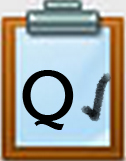Q3 Employability: Soft Skills
Soft skills are character or personality traits that can be applied to any career. Examples of soft skills include time management and problem-solving.
Play the video below as a starting point for understanding Soft Skills.
What Are Soft Skills
Direct link (2:27 min.)
The U.S. Department of Labor identifies seven soft skills as the most important for young workers to be successful in the 21st-century workplace.
- Networking
- Enthusiasm
- Professionalism
- Teamwork
- Communication Skills
- Problem-Solving
- Critical Thinking
Read the article, Soft Skills: The Competitive Edge by the U.S. Department of Labor, to learn more about each skill listed.
You may want to take notes on the important points in the article.
Soft Skills Quiz
Now it is your turn to practice and show your understanding of soft skills in job settings.
Complete this Soft Skills Quiz. Before completing the quiz, ensure you have played the video below and read the article on this page.
- Tips: Spelling matters. If the answer is correct, the line under the word will turn green, and if the answer is incorrect, the line under the word will turn red with an "oops, try again."
- You will need to take a screenshot of your certificate to add to your Career Prep Portfolio.
OneNote Career Prep Portfolio:
- Make sure you have access to the screenshot you took with your name and certificate.
- Go to your Career Prep Portfolio, select Quest Three: Employability, and complete the Soft Skills section.
Google Site Career Prep Portfolio (also outlined in the video below):
- Make sure you have access to the screenshot you took with your name and certificate.
- Go to your Career Prep Portfolio and select the Q3 page where the Soft Skill Quiz Certificate section is located.
- In the right menu, select Insert, then Images, then Upload. Make sure the image is sized to the full size so your name also shows.
- Make sure your page is saved.
Direct link (14 sec.)
Competencies & Standards
MITECS Michigan Integrated Technology Competencies for Students, and
1. Empowered Learner
a. Connect their learning needs, strengths and interests to their goals and use technology to help achieve them and reflect on their progress.
3. Knowledge Constructor
a. Use effective research strategies to find resources that support their learning needs, personal interests and creative pursuits.
c. Curate information from digital resources using a variety of tools and methods to create collections or artifacts that demonstrate meaningful connections or conclusions.
d. Build knowledge by actively exploring real-world issues and problems, developing ideas and theories, and pursuing answers and solutions.
6. Creative Communicator
a. Choose the appropriate platforms and tools for meeting the desired objectives of their creation or communication.
c. Use digital tools to visually communicate complex ideas to others.
d. Publish or present content that customizes the message and medium for their intended audiences.
Websites and Documents
Websites
Videos from Outside Sources
- What Are Soft Skills rev2022 captioned YouTube (2:26 min.)
21T4S Videos




